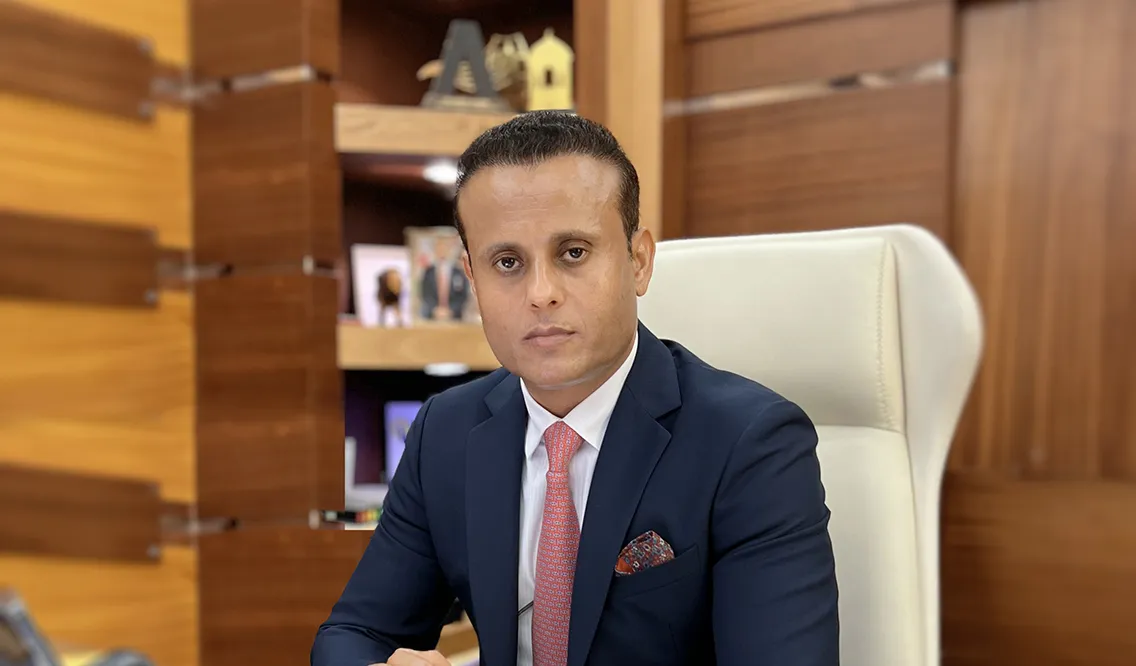Established in 2008, CAC International Bank is Djibouti’s second largest bank. Ahmed Al Deib, its chief executive officer, believes the bank’s growth mirrors the broader transformation going on in the country, as the small eastern African country builds up its infrastructure to take full advantage of its strategic location along the Red Sea and the Gulf of Aden.
Over the last decade in particular, Al Deib tells us, Djibouti has made some crucial interventions to enhance its infrastructure and by extension, trade, lending a significant fillip to the economy. It is making investments in energy, such as the 60 MW Ghoubet Wind Power Station; the Galafi–Nagad high voltage power line and the Grand Bara solar power station, which is set for commissioning this year. It has strengthened its industrial sector through the establishment of free trade zones designed to attract foreign investment, particularly in manufacturing and logistics.
Ports in focus
The ports have, naturally, received the most attention, as the country enhances its role as a gateway for cargo, particularly for Ethiopia. Ongoing investments in port infrastructure aim to handle increasing trade volumes, reinforcing the country’s position as a leading transshipment and logistics hub. At the same time, transportation infrastructure is also receiving substantial investment, with road and rail projects improving connectivity both within the country and across borders. For investors, this makes it easier to take advantage of the country’s natural geographical advantages and utilise it as a logistics hub with easy access to international markets.
These efforts have provided a conducive environment for businesses, including CAC International Bank, which has embraced its role as a development enabler. “We have ignited a revolution here from digital services to customer care, cybersecurity, diversified products and social responsibility,” Al Deib says.
Healthy competition
One of the 12 banks in a country with a population of just over a million, CAC International Bank has stiff competition to deal with, although Al Deib is quick to describe the competition as “healthy”. He says, however, that too high a level of competition can incentivise risky behaviour, but for CAC International Bank caution is key and remaining liquid is king.
Ethiopia, Djibouti’s much larger, landlocked neighbour with a growing economy is an important source of business for Djibouti, relying as it does on the country’s ports for access to global markets. CAC International Bank has responded to this opportunity, supporting several products such as working capital for transiters, import and export letters of credit, commodity financing, and stock financing.
Currently, Al Deib says, the bank’s major clients are corporate. It is, however, hoping to rebuild its retail portfolio, using mobile banking as an anchor to bring in more clients in that segment of the market. “We were the first bank to invest in mobile banking, and we have been educating people about digital services.” The effort, which has included everything from advertisements to in-person workshops, is paying off, he reports. “The market is now ready.”
The bank has recently launched a separate Islamic bank, in response to a growing demand for alternative finance models including sharia-compliant banking that is interest-free. “It’s a trend, especially in our region and we want to increase our market share,” Al Deib says. According to him, CAC International Bank has put all the infrastructure in place, including a separate IT system and a building to manage and house this new arm, which has its own independent licence to operate. It has also recruited some old and experienced hands to manage the new initiative.
Al Deib says the Islamic division will enable the bank to diversify and expand financial inclusion to a key and growing demographic. “It will help us reach customers who prefer banking services that align with their sharia-compliant principles. This includes individuals and businesses that wish to avoid interest-based transactions.” The market for sharia-compliant financial products is growing, especially in the Middle East and parts of Africa, and in a Muslim-majority market like Djibouti, CAC is making the calculation that it can tap into a natural market. As Djibouti positions itself as a hub for investments from the Gulf region, launching the CAC Islamic Bank could prove to be a savvy initiative from the bank.
Reforms as key enablers
For Al Deib, the economic and infrastructure reforms that have taken place in the country over the course of the bank’s existence have been key enablers of growth for the banking sector. “Djibouti has been positioning itself as a key gateway for trade, investment, and economic integration in the Horn of Africa and I’ve seen the country evolve significantly, especially in terms of infrastructure, economic policies, and the broader business environment. This is what will make you better than the competition coming from neighbouring countries.”
Regulatory reforms have been helpful, too. “The government has been proactive in introducing reforms aimed at improving the ease of doing business, such as simplifying business registration processes, customs procedures, and streamlining regulations,” he points out. Investors, he says, are also drawn by the relatively stable macroeconomic environment. Inflation has remained fairly stable and the Djiboutian franc is pegged to the US dollar, which provides currency stability and reduces the risk of foreign exchange fluctuations for investors.
Djibouti’s steady economic reforms and infrastructure investments have created an enabling environment for financial institutions like CAC International Bank. The country’s political stability, strategic location, and growing trade networks have provided a foundation for business expansion.
The bank’s edge has come from capitalising on the advantages afforded by reforms, while supporting economic growth by facilitating trade finance, infrastructure development and digital banking. Djibouti’s commitment to political stability and regional integration means the bank can also expand its role as the country’s influence deepens.
Crédito: Link de origem


